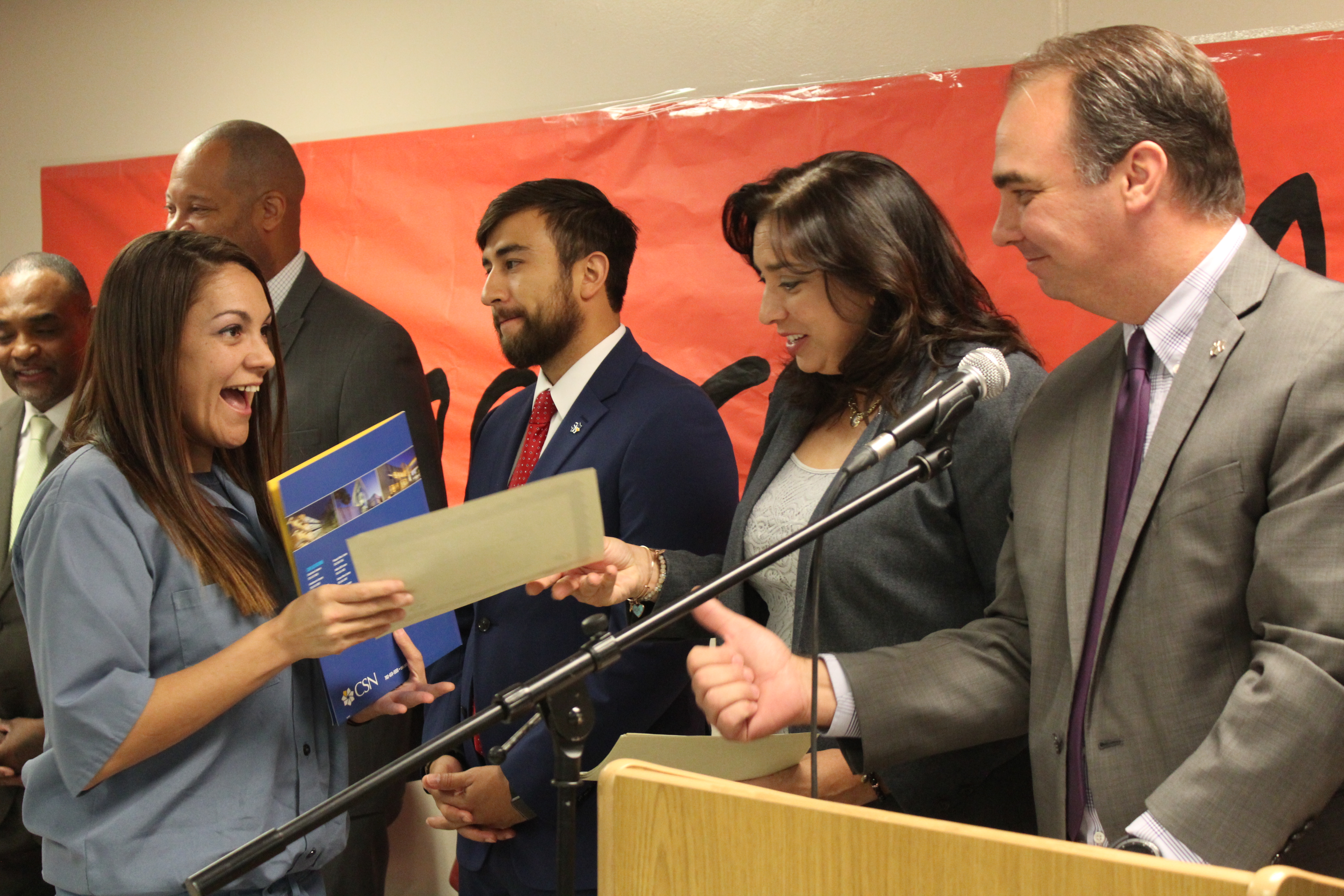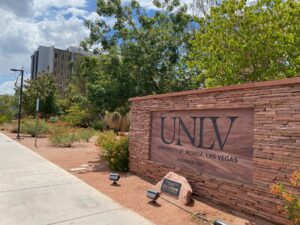When Natasha Barker entered Florence McClure Women’s Correctional Center last year, she dreaded the day of her release because of the unknowns it came with. Concerns about life after incarceration often plague many inmates.
“There are all these questions about whether or not we can find a job, if we will re-offend or if we will end up back in here,” she said.
Some of those fears have been alleviated with the completion of two college courses, connections to re-entry services and a better support system.
“I see more possibilities now,” she said. “I see a way to stand on my own two feet.”
Barker was part of a pilot program spearheaded by the College of Southern Nevada and the Nevada Department of Corrections.
Selected inmates, who are close to their release dates, take a three-credit college success course and then choose either a vocational track or a college path.
The first route allows inmates to receive OSHA and CPR certifications, which they will need to apply for various labor jobs. The Laborers Union Local 872 also signed on as a program partner so inmates have an opportunity to get connected to the union, gain mentorship and find jobs upon release.
The second track includes a communications course – introduction to public speaking. For students going this route, they pick up an additional three-credits and have the opportunity to attend CSN upon release.
The first cohort of 25 men from High Desert State Prison hosted their ceremony in May. Barker was joined by 22 women this week for the completion ceremony.
There was a mixture of tears and excitement as the women sat through speeches from legislators, Nevada Department of Correction officials and community partners.
“This all feels surreal,” Barker said. “There is no other way to describe this. This program helped us realize our potential. It helped us see we are actually college material.”
“…a matter of public safety”
The majority of inmates in the Nevada Department of Corrections are going to be released eventually. Whether they are prepared for re-entering society is another question, which is why the department is looking at programing and services that aid the transition process.
“Re-entry shouldn’t just be a word,” said Kim Thomas, the deputy director of programs for the Nevada Department of Corrections. “In a lot of states, it is just a word. There isn’t a lot of substance behind it.”
Nevadans spend about $20,000 each year on each incarcerated inmate, according to the Nevada Department of Corrections. Thomas says it makes sense to spend money to make sure they don’t end up back in the system, which would cost taxpayers more.
One way is to invest in educational opportunities for inmates.
“You can make statistics say anything you want,” Thomas said. “However, the one thing that has been proven is the more education someone gets, the less likely they are to return to prison.”
Margaret diZerega, the project director with the Vera Institute for Justice, said research shows there are benefits for providing educational opportunities.
“Those who participate in post-secondary education programs are 43 percent less likely to recidivate,” diZerega said. “We know that 65 percent of all new jobs require some form of post-secondary education, but only 22 percent of people in state prisons have some form of it.”
Education also reduces violence in prisons.
“We’ve talked to people in corrections,” she said. “They say when you reduce the amount of free time (through educational opportunities) they are able to focus on the positive and move forward.”
In a tough-on-crime society, some people tend to look at educational opportunities, or most re-entry programs, as a waste of money that rewards criminals.
“This is actually a matter of public safety,” Thomas said. “These people are going to be released. If we are doing a good job at re-entry, then we are making our community safer.”
It’s not just giving people the skills they need. “This boosts their confidence,” Thomas said. “A lot of these offenders don’t have a good perception of themselves.”
In general, educational and vocational programs used to be more common in corrections, said Dwight Neven, warden of the Florence McClure Women’s Correctional Center. As budgets decreased, so did the programing.
That was the case with Nevada.
There used to be a partnership with CSN and the department of corrections, but it was suspended in 2008 due to budget constraints.
In the last few years, the department has increased vocational opportunities such as culinary training.
In the 2017 legislative session, there was a push to fund a pilot program that would offer college courses through CSN. Senate Bill 306 passed unanimously in the Senate and 34-8 in the Assembly, and was signed into law by Gov. Brian Sandoval.
“Not everyone had faith in you,” state Sen. Aaron Ford, who sponsored the legislation, told the women at their ceremony Wednesday. “A lot of people wanted to throw you away because they think you aren’t good.” Ford, the Democratic candidate for Nevada attorney general, also attended the men’s completion ceremony in May.
After release
Jolynn Cruz, who was at the June ceremony, is about 10 days away from being released, and is ready to begin working as soon as she gets out.
“The best chance I’ll have (of not returning) is to go to a good-paying job,” she said. “I think I would have been more nervous to find a job if I didn’t have this program.”
Beyond education, her path to success also includes community partners that will help her on the outside.
Along with an open door to CSN and a relationship with the laborers union, inmates are also introduced to Hope for Prisoners, a nonprofit that assists with re-entry services.
Its founder, Jon Ponder, was released almost a decade ago from High Desert State Prison after years in and out of crime.
“I didn’t have this type of support when I left,” he said.
He tells the inmates that their prison sentence had the opportunity of steering them in the wrong direction, but this is now the chance to correct the course.
“And you can’t do that while you’re looking at your past,” Ponder said.
One formerly incarcerated man named Jason (who declined to give his last name) is already starting his future after participating in the program.
On a Saturday afternoon in June, he was studying at a CSN Charleston campus trying to get ahead on precalculus homework.
Jason knew he wanted to spend his time while incarcerated bettering himself. He earned his GED. He began purchasing books to study math. His sights were fixed on one day getting out, going to college and becoming an engineer.
“Without this program, I don’t think I would have known how to get financial assistance to go to college,” he said.
While going through the program, Jason said his fellow inmates would ask him how to join. “There is a huge demand for this,” he said. “If you’re going to house us, you should invest in us.”
Jason was released in March, but finished the program anyway through CSN. After landing a job, he registered for summer courses at CSN.
After her release this year, Barker also wants to continue college at CSN so she can get a business degree.
The second class of students is scheduled to start in the fall. The plan is to go before the Legislature in 2019 to ask for more program funding.
To ensure that happens and the program is expanded to more inmates, Ford says it’s up to the students to make a case by being a good example.
“You have to prove to the folks who didn’t believe in you that they were wrong,” Ford said.
Our stories may be republished online or in print under Creative Commons license CC BY-NC-ND 4.0. We ask that you edit only for style or to shorten, provide proper attribution and link to our website. AP and Getty images may not be republished. Please see our republishing guidelines for use of any other photos and graphics.




